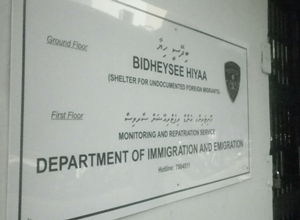Lack of government support has caused a “crisis situation” for Care Society, the only institution providing schooling for a diversity of special needs individuals of any age and type of disability.
The Care Society was given a government-owned building in Male’s Heniveru neighborhood with a five-year lease agreement under former President Mohamed Nasheed’s government. The NGO has said it has been seeking a 20-year lease extension from President Waheed Hassan Manik’s government, to no avail.
The lease extension is necessary to secure private funds to rebuild the structure and expand services, but the Care Society has not received a definitive response from the Ministry of Finance and Treasury, despite the Ministry of Housing and Environment granting their approval, Care Society Director Shidhatha Shareef told Minivan News.
“Currently the Care Society works from a private residence donated by a Saudi Prince, but our lease is up at the end of May and we might have to shut down because we have no place to go. It will be a real loss for the children,” stated Shidhatha.
“We have not received any response from the government. The Housing Ministry approved the 20-year lease extension for the new building in writing, but the Finance Ministry has final approval and they still have not provided a definite response. We just want a yes or no answer.”
Shidhatha explained the Care Society has been seeking a “sustainable long term premises” since 2006 and has spent the last four years continually talking to and meeting with government officials. In addition to the Housing and Finance Ministries, they have been in contact with the President’s Office, Vice President Mohamed Waheed Deen, the Human Rights Commission of the Maldives (HRCM), and the National Disability Council.
“When we spoke to Finance Minister Abdulla Jihad about approving the lease extension he said he would ‘work on it’. Additionally, the Vice President Waheed Deen visited the premises and ‘expressed concern’ because the building is so old.
“Meanwhile, the engineers we’ve spoken to said the structure will have to be rebuilt, even the walls are not worth reusing. Care Society has a number of private investors interested in developing the building, however they are not willing to invest if the lease term expires in 2015.
“Ultimately, the government has an obligation to facilitate the process. They are mandated by the constitution and Disability Act to provide educational services to the disabled,” said Shidhatha.
Care Society has been working for the rights of the disabled for 14 years and established the Care Development Centre in 2001, a ‘special school’ for special needs individuals with all sorts of disabilities, including down syndrome, autism, cerebral palsy, physical disabilities, as well as the hearing and vision impaired.
This school provides services for any age, ranging from early intervention programs for one year-olds all the way to elderly individuals.
“Care Society runs the only school that caters to a diversity of special needs disorders and any age group,” Shidhatha explained.
“We work with 600 children and people with disabilities regularly, our school currently has 43 students and another 20 children on the waiting list, however we lack the space to accommodate them at this time,” she added.
Currently there are two government schools, Jamaluddin which only caters to the hearing impaired and Imaduddin which offers classes for the intellectually impaired. The problem is their age limitations, as once students exceed age 18 they are sent out of the school, Shidhatha said.
Additionally, the handful of other NGOs working with the disabled persons in the Maldives only address one type of disability or limit their target group age, Shidhatha added.
Care Society’s objectives include promoting rights of disabled people, rights of children and women, capacity building of CBOs and NGOs and assisting victims of natural disasters.
“Responsibility for ensuring disabled rights first falls on government”: Waheed
The Human Rights Commission of the Maldives (HRCM) began a “National Inquiry on Access to Education for Children with Disabilities” in January 2013.
The study was launched in November 2012 to “look into the practices, policies and laws related to the education for children with disabilities. HRCM will also inquire into the States role in providing for people with disabilities in a non-discriminatory manner, with a special focus on the educational needs of children with disabilities”.
According to the most recent study on the disabled conducted by the HRCM in 2010, there are 2250 children with disabilities in the Maldives that are registered with the government, while only 230 of these children attend school. Overall, 14,100 persons, about 4.7 percent of the population, were found to have permanent disabilities.
In July 2012, the Ministry of Gender, Family and Human Rights and the national Disability Council conferred the Disability Award 2012 to “individuals and organizations working for the rights of the disabled”.
Care Society received an award, which was presented by President Waheed.
Waheed “noted that the responsibility of ensuring the rights of the disabled first falls on the government, and assured that the government was always carrying out that responsibility as best as possible.”
Recent studies by the HRCM – primarily a women’s rights study and children’s participation study – found that lack of access to services were the primary issues discussed by the disabled.
Inadequate special needs schools for children and facilities within existing schools for them, as well as education and mental health service opportunities are of particular concern.
The Finance Ministry, President’s Office, and Housing Ministry were not responding to calls at the time of press.

